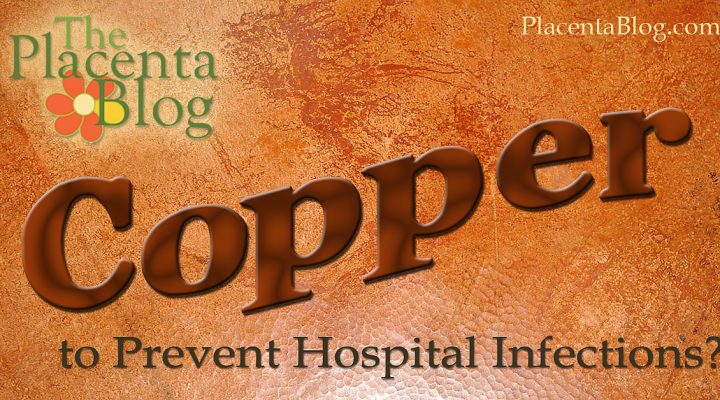Daniel Rubens, an anesthesiologist at Seattle Children’s Hospital may be one step closer to discovering the cause of Sudden Infant Death Syndrome (SIDS). The syndrome, causing seemingly healthy babies to mysteriously die in their sleep, has 4,000 victims in the US annually. Dr. Rubens has a hypothesis that babies who become victims of SIDS […]
Kellyann Battista is certified!
Congratulations to Kellyann Battista of Simpsonville, SC on completing her certification. Kellyann serves new mothers in the Anderson, Greenville And Spartanburg Area. Becoming certified takes lots of hard work and dedication. To become certified, a candidate must read and write response papers to research regarding placentophagy. The candidate must then prepare 3 placentas using […]
Could Copper Prevent Infections In Hospital Patients?
It is estimated that 1 in 25 hospital patients acquire an infection that was unrelated to the illness the were initially hospitalized for. In the US, it costs approximately $40 billion per year to treat patients who became infected during their hospital stay. As you can imagine there are many ramifications to these healthcare-acquired […]
Samantha Mahon of Southeast GA joins PBi!
Samantha Mahon, serving Georgia, South Carolina and Florida, believes firmly in the body’s innate wisdom, particularly when it applies to pregnancy and birth. After suffering from postpartum depression, Samantha began researching placenta encapsulation. After a remarkable experience with placenta encapsulation following her second son’s birth, Samantha knew it was a service she needed to be […]
Welcome Crimson Walton, North Carolina!
The PBi Network of Specialists is excited to introduce Crimson Walton, serving Wilmington, Wrightsville Beach, Hampstead, Carolina Beach, Kure Beach, Leland, NC. Crimson is a mother of two who felt very inspired to help other women achieve postpartum wellness after her own experience with placenta encapsulation. Crimson felt her postpartum experience after her second child […]
Common drug given after birth linked to poor breastfeeding outcomes
A drug commonly given to women to speed up the delivery of the placenta is now being blamed for poor breastfeeding rates in the UK. The drug known as ergotmetrine has been determined to disrupt the body’s response to the birth hormone oxytocin and prolactin, a hormone responsible for milk production in mothers. While […]



